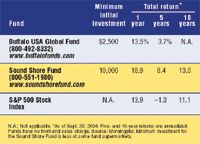Article
Funds of the Month
Large-cap stocks
What they offer The chance to rise with the market while limiting volatility. Large companies (generally from $5 to $25 billion in capitalization) may no longer have rapid growth spurts, but their ongoing business success can still rake in profits.
"Historically, large-caps have become very profitable a couple of years into a market recovery, and that's where we're headed now," says Peter A. Mallouk, a financial adviser and attorney with Creative Planning, and The Will and Trust Center, both in Overland Park, KS. "Still, the most important reason to buy large-cap funds is to keep some core holdings while diversifying your portfolio. You'll get exposure to the market's movements, but with less volatility than you'll have in your small and mid-cap funds. You want to buy now, when prices are relatively low, rather than when large-caps start to really climb."
The choicesSound Shore Fund. This hidden gem isn't known to the masses. It's the only fund offered by Sound Shore Management, which holds the pension money of many Fortune 500 companies. The fund is one of only about 100 equity mutual funds (out of the more than 3,600 domestic stock funds tracked by Morningstar) that has beaten the S&P 500 over one, three, five, 10, and 15 years. Sound Shore Fund managers look for US companies that are currently getting the cold shoulder from Wall Street. The companies are financially solid but beset by setbacks that the fund's managers believe will be temporary. The portfolio managers also hold out for stocks selling for a lower-than-usual price-earnings ratio.
Buffalo USA Global Fund. This fund invests in US-based companies that get at least 40 percent of their revenues from international operations. Fund shareholders benefit from international commerce while minimizing the liquidity and political risks that often come with directly owning stock in foreign companies.
The fund's portfolio managers will invest in either value or growth companies, as long as they see potential profits. "They identify macroeconomic and demographic trends-such as aging Baby Boomers and the products they'll be buying-and look for companies that will prosper from those directions," says Mallouk. Like Sound Shore Fund, Buffalo USA Global Fund typically holds fewer than 50 stocks. It's a much smaller fund, though, with $86 million in assets vs Sound Shore's $1.4 billion.






